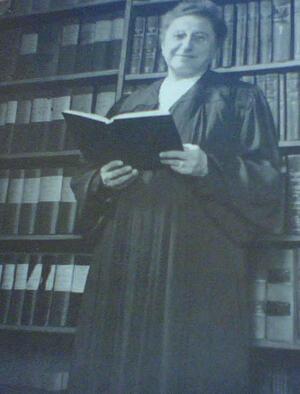Jennie Loitman Barron
Jennie Loitman Barron was the first woman justice of the Massachusetts Superior Court. In college she organized the Boston University Equal Suffrage League, and she later lobbied for the right of women to serve as jurors. She opened her own law practice in 1914, and in 1934 she was appointed assistant attorney general of Massachusetts, becoming the first woman to try a major criminal case in the state. Beyond her career in the criminal justice system, she worked as the first president of the Women’s Division of the American Jewish Congress and a national board member of Hadassah. Appointed a Superior Court Justice in 1957, she served on the bench until a week before her death at age seventy-seven.
Even as a schoolgirl, Jennie Loitman Barron ignored society’s limits and set high goals for herself. In her long career as a lawyer and a judge, and in her lifelong work for women’s rights, she set many precedents for women in Massachusetts and across the United States.
Early Life and Education
Jennie Loitman Barron was born on October 12, 1891, to Russian immigrant parents Fannie and Morris Loitman. She was one of four daughters and grew up in Boston’s West End with few material benefits. “Money isn’t important,” her mother told her. “It can be lost or stolen. Learning is the thing that enriches your spirit—and that, no one can take from you.” Jennie never forgot that advice.
Out of necessity, she worked part-time while attending high school. In spite of the hours away from her studies, she graduated as valedictorian from Girls’ High School in Boston at age fifteen and went straight to college. Selling books door to door and teaching Americanization classes at night did not postpone her graduation. In fact, she earned a four-year degree from Boston University in only three years and was awarded her law degree two years after that. In 1914, she received her master of law from the same university, one of the few women to earn such a high degree.
While still at college, Jennie joined the suffragist movement. She organized and became the first president of the Boston University Equal Suffrage League, marching with her fellow members in parades and giving soapbox speeches. Even after women had gained the right to vote in 1920, she continued working for women’s rights. She was a delegate to the National Committee of Uniform Laws Regarding Marriage and Divorce in 1930 and lobbied for the right of women to serve as jurors.
Career
After being admitted to the Massachusetts bar in 1914, she opened her own law practice in Boston. Unlike many other committed suffragists, she supported America’s involvement in World War I and became executive secretary of the Liberty Loan Bond Committee. Just before the end of the war, in June 1918, she married her childhood sweetheart, Samuel Barron, also a Massachusetts lawyer. By the end of that year, the couple opened up a joint practice, Barron and Barron. Their partnership lasted until 1934, when Jennie Barron was appointed assistant attorney general of Massachusetts.
Beginning with that first appointment, Barron broke many barriers. She was the first woman to try a major criminal case in her state. A few years later, in 1937, she was named associate justice of the Boston Municipal Court, the first woman to serve as a full-time justice in Massachusetts. She was the first mother on the Boston School Committee, and the first female United States delegate to the United Nations Congress on Crime and Juvenile Delinquency. In 1957, she was the first woman to be appointed justice of the Massachusetts Superior Court.
“It is a 365-day-a-year job,” Barron said, “because when not in court there are decisions to be written, citations to be looked up, problems to be pondered.”
Family and Legacy
In spite of her demanding job, Barron found time and energy to accept international appointments, travel all over the world, and raise three daughters, Erma, Deborah, and Joy. She remained close to her expanding family, gathering them at her Sabbath table every Friday night. In 1959, already a grandmother, she was awarded the National Mother of the Year Award by American Mothers, Inc.
Barron actively participated in numerous volunteer organizations. She was the first president of the Women’s Division of the American Jewish Congress, national board member of Hadassah, and honorary president of Beth Israel Hospital and the Boston Women’s Division of the American Jewish Congress. In addition, she was a director of the Home Owners Cooperative Bank and chair of the League of Women Voters.
In June 1968, Jennie and Samuel Barron were honored by hundreds of friends and public officials on the occasion of their golden wedding anniversary. Just one week later, Samuel Barron died. Jennie Loitman Barron died the following year, on March 28, 1969. She was seventy-seven years old and had remained on the bench until her heart attack the week before. In a previous statement about her work, Barron had defined as her goals “to make our city, our country better, to promote human brotherhood, to be good citizens.” The crowd of dignitaries of all religions and political parties who attended her funeral attested to her success in achieving those goals.
Barron, Jennie L. Papers. Schlesinger Library, Radcliffe College, Cambridge, Mass..
BEOAJ.
Boston Globe, March 28, 1969.
EJ; Kuzmack, Linda Gordon. Woman’s Cause: The Jewish Woman’s Movement in England and the United States, 1881–1933 (1990).
NAW modern.
Obituary. NYTimes, March 30, 1969, 71:5.
UJE.
WWIAJ (1928 addenda, 1938).



